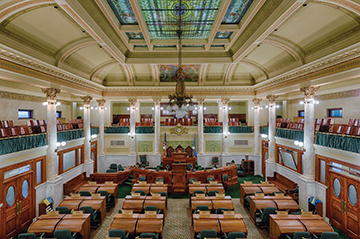- Education & Events
- Advocacy
- Products & Services
- Membership
- Resources
- SDBANKER Magazine
- SDBA eNews
- SDBA eNews Archives
- Legislative Update/Bill Watch
- South Dakota Bank Directory
- Women in Banking
- Scenes of South Dakota Calendar*
- Holiday Signs
- Regulatory Report
- South Dakota Banking Code
- Record Retention Manual
- Advertising & Sponsorship Guide
- COVID-19 Resources
- Mental Health and Crisis Prevention
- About
|
Make Sure Our Industry Is Heard at 2022 SDBA State Legislative Day
The day will include an SDBA Legislative Committee meeting, lunch, SDBA update, featured speaker Dr. Chris Kuehl, Gov. Kristi Noem (invited), the chance to visit with state legislators at the State Capitol, and an evening reception with state legislators and constitutional officers. The day will also include special sessions specifically designed for emerging bank leaders. Dr. Kuehl will present "Is 2021 Really in the Rear View?" Now that we have entered 2022, are we seeing the progress we hoped for? What issues are still affecting the economy? Where has there been some progress? What are the new concerns? Inflation, labor shortages, supply chain disruption and the pandemic are still playing havoc with the system, but there has also been some good news in terms of growth—especially in the agricultural sector. See the full agenda and register. Registration Open for 2022 Dakota School of Lending Principles
In the four modules on loan types (consumer lending, real estate lending, analyzing small business loans and agricultural lending), learn the lending process by studying elements applicable to each loan type: terminology, the application process, interviewing, investigation, credit analysis, loan structure, decision communication and selling. Case studies and exercises provide hands-on learning experience. The school provides basic instruction appropriate for loan officer trainees, loan support personnel and personal bankers. To ensure exposure to bank structure and terminology, it is recommended that applicants have a minimum of six months lending experience or one year of loan department experience. Applicants not meeting the suggested prerequisites will be contacted to discuss admission qualifications. This school is limited to 50 students, so register early to save your seat. Learn more and register.
McWilliams Op-Ed Reveals New Details on FDIC Board ConflictIn a Wall Street Journal op-ed posted last night, FDIC Chairman Jelena McWilliams provided new details about the recent conflict among FDIC board members and shared her perspective on the agency’s independence. The conflict stemmed from the desire of at least two of the FDIC board’s four members to release a request for information about the agency’s bank merger procedures. McWilliams’s op-ed outlines the timing of communications and attempted email votes by the FDIC board members and the back-and-forth over the RFI process, which she described as “a brazen attempt to seize control from the FDIC executive secretary, who alone is in charge of official board distributions.” “Of the 20 chairmen who preceded me at the FDIC, nine faced a majority of the board members from the opposing party, including [current Director Martin] Gruenberg as chairman under President Trump until I replaced him as chairman in 2018. Never before has a majority of the board attempted to circumvent the chairman to pursue their own agenda,” she wrote. “This conflict isn’t about bank mergers. If it were, board members would have been willing to work with me and the FDIC staff rather than attempt a hostile takeover of the FDIC internal processes, staff and board agenda.” McWilliams’ op-ed comes after CFPB Director Rohit Chopra, who sought to have the FDIC board vote on his preferred RFI document, said this week that “board members will need to take further steps to exercise independence from management.” Meanwhile, in a letter Monday to the four FDIC directors, ABA and the state bankers associations emphasized the importance of FDIC independence and transparency to the confidence of banks and consumers in deposit insurance and FDIC supervision. Read the op-ed. ABA Foundation, Kentucky Bankers Team Up to Support Tornado Relief EffortsIn the wake of the devastating tornadoes that struck Kentucky and other mid-South states last weekend, the ABA Foundation has partnered with the Kentucky Bankers Association to support relief efforts. At KBA’s request, the ABA Foundation is collecting donations from across the country to support the Kentucky Bankers Relief Fund. One hundred percent of the funds raised through ABA Foundation’s Disaster Relief Program will support fellow bankers directly affected by the tornadoes, along with other local relief efforts. Donations will be accepted until Jan. 25, 2022, and all donations are tax deductible to the fullest extent of the law. “We are heartbroken by the devastation and loss of life that occurred in Kentucky this past weekend,” said ABA President and CEO Rob Nichols. “We know thousands of Kentuckians, including members of our banking family, need help right now, and we hope that the generosity of fellow bankers across the country through the ABA Foundation can provide some relief.” This is the second time the ABA Foundation has activated its disaster relief program, which allows state bankers associations to request disaster relief fundraising for their specific state through the ABA Foundation in the event of a presidentially-declared disaster and when other specific criteria are met. In related news, the Internal Revenue Service on Tuesday announced that it would extend the tax filing deadline for those affected by the tornadoes until May 16, 2022. Affected individuals and businesses will have until May 16 to file returns and pay any taxes that were originally due during this period, including 2021 individual income tax returns due on April 18, as well as various 2021 business returns normally due on March 15 and April 18. ABA Offers Guide to Assist Bankers with Section 1071 Comment LettersWith the CFPB currently accepting comments on its proposal to implement Dodd-Frank Act Section 1071—which requires lenders to collect and report data on small business credit applications—ABA has published a comment letter writing guide to assist bankers who wish to submit feedback. The guide provides helpful tips for what to include in the comment letter and how to submit it to the CFPB. ABA is urging all bankers to provide feedback on this important rulemaking. Comments are due on Jan. 6. View the guide.
USDA Makes Funds Available to Bolster Food Supply ChainThe U.S. Department of Agriculture announced last Thursday it is deploying $100 million under the new Food Supply Chain Guaranteed Loan Program to make nearly $1 billion in loan guarantees. The funding is available through the American Rescue Plan Act. Through the Food Supply Chain Guaranteed Loan Program, USDA will partner with lenders to guarantee loans of up to $40 million to help eligible entities expand meat and poultry processing capacity and finance other food supply chain infrastructure. Lenders may provide the loans to eligible cooperatives, corporations, for-profits, nonprofits, tribal communities, public bodies and people in rural and urban areas. USDA Rural Development will administer the loans. USDA is accepting electronic applications from lenders through the Food Supply Chain Online Application System until funds are expended. Paper applications will not be accepted. Learn more about applying. Read more about the program. Don't Miss Unique Midwest and National 2022 Economic ForecastThe Midwest Economic Forecast Forum will be presented on Tuesday, Jan. 4, virtually by the Wisconsin Bankers Association, in partnership with the Illinois Bankers Association, Michigan Bankers Association, Minnesota Bankers Association, Montana Bankers Association and South Dakota Bankers Association. The forum will be held from 10:30 a.m. to noon CST. Prepare for 2022 by joining an economic outlook with Minneapolis Fed President Neel Kashkari during this virtual event. Then listen to Dr. David Kohl, economist and professor emeritus with Virginia Tech, as he dives into the economic mega trends he expects in 2022 and beyond. Bankers are encouraged to invite their best clients to virtually share these economic insights. Individual or group registration rates are available. Learn more and register.
Learn Succession Planning How-To'sPrairie Family Business Association will hold a Succession Planning How-To's Webinar on Friday, Jan. 7, at 10 a.m. CST. Learn from three families in various stages of their succession plans: David and Jan Johnson of Reliabank, Jarod Stec of Stec's Advertising, and Darcy Christenson of Quality and Triview Communications. You'll come away with strategies that work as well as pitfalls for you to avoid. Learn more and register.
Question of the Week
Question: The bank currently provides the risk-based pricing notice in accordance with model forms H-3 and H-4, under the FCRA and Regulation V, for loans secured and not secured by residential real estate, respectively. The bank does not employ a credit scoring model or a tiered system for pricing but is considering such an approach. Do these notices still satisfy the disclosure requirements in that case? Would those systems then require periodic testing under FCRA, or would that be more for purposes of fair lending? Answer: If you choose to adopt a risk-based price tier system, then providing model forms H-3 and H-4 will meet the risk-based pricing notice requirements as long as H-3 is used when the consumer requests an extension of credit that will be secured by 1-4 units of residential property and H4 for credit that will not be secured by 1-4 units of residential property. For testing purposes, under the FCRA, the system itself would not require periodic testing but examiners do test on the sufficiency of notices being sent out when you do use a tier-based system: VIII. Privacy — Fair Credit Reporting Act (fdic.gov), (pg. 6.29) - https://www.fdic.gov/resources/supervision-and-examinations/consumer-compliance-examination-manual/documents/8/viii-6-1.pdf Regulation V, § 1022.74 - https://www.consumerfinance.gov/rules-policy/regulations/1022/74/#d Not a member? Learn more about membership with Compliance Alliance by attending one of our live demos: Compliance Alliance offers a comprehensive suite of compliance management solutions. To learn how to put them to work for your bank, call 888.353.3933 or email and ask for our Membership Team. For timely compliance updates, subscribe to Bankers Alliance’s email newsletters. SDBA eNews Archive Advertising Opportunity Questions/Comments |


 The SDBA State Legislative Day on Feb. 9, 2022, at the Ramkota Hotel & Conference Center in Pierre is your opportunity to stay up-to-date on both state and federal legislation which could affect the banking industry, visit with state legislators and constitutional officers, and make sure our industry is heard.
The SDBA State Legislative Day on Feb. 9, 2022, at the Ramkota Hotel & Conference Center in Pierre is your opportunity to stay up-to-date on both state and federal legislation which could affect the banking industry, visit with state legislators and constitutional officers, and make sure our industry is heard. The Dakota School of Lending Principles, hosted by the South Dakota Bankers Association and co-sponsored by the North Dakota Bankers Association on March 29 - April 1, 2022, in Aberdeen is a learning event with one foot grounded in the classroom and one foot in the bank. This school allows students to learn the theory and process of basic lending and then put this knowledge to work in actual nuts and bolts sessions.
The Dakota School of Lending Principles, hosted by the South Dakota Bankers Association and co-sponsored by the North Dakota Bankers Association on March 29 - April 1, 2022, in Aberdeen is a learning event with one foot grounded in the classroom and one foot in the bank. This school allows students to learn the theory and process of basic lending and then put this knowledge to work in actual nuts and bolts sessions.
